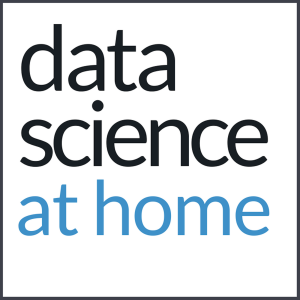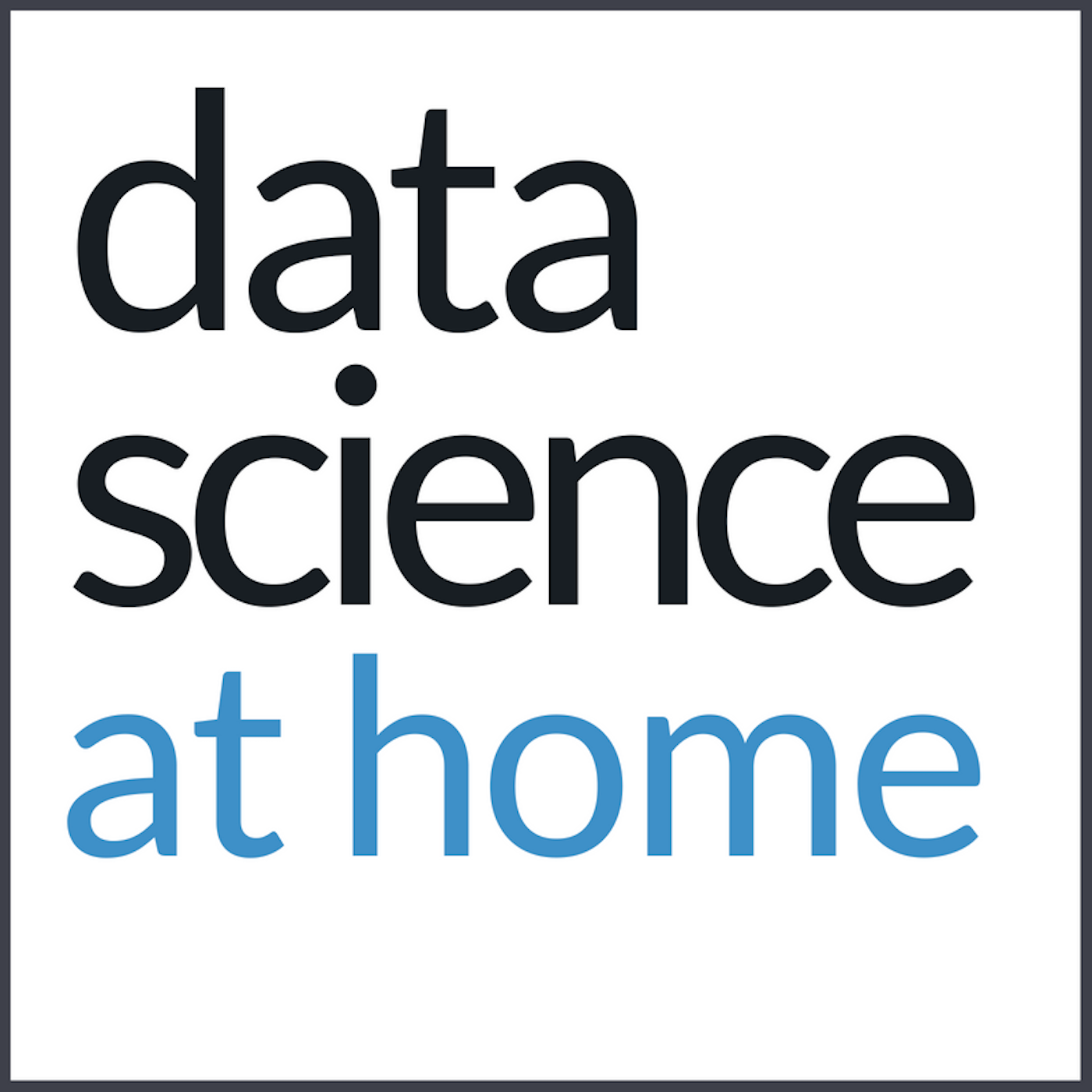Data Science at Home
Episodes

Wednesday Dec 19, 2018
Episode 49: The promises of Artificial Intelligence
Wednesday Dec 19, 2018
Wednesday Dec 19, 2018
It's always good to put in perspective all the findings in AI, in order to clear some of the most common misunderstandings and promises. In this episode I make a list of some of the most misleading statements about what artificial intelligence can achieve in the near future.

Sunday Oct 21, 2018
Episode 48: Coffee, Machine Learning and Blockchain
Sunday Oct 21, 2018
Sunday Oct 21, 2018
In this episode - which I advise to consume at night, in a quite place - I speak about private machine learning and blockchain, while I sip a cup of coffee in my home office.There are several reasons why I believe we should start thinking about private machine learning...It doesn't really matter what approach becomes successful and gets adopted, as long as it makes private machine learning possible. If people own their data, they should also own the by-product of such data.
Decentralized machine learning makes this scenario possible.
![Episode 47: Are you ready for AI winter? [Rebroadcast]](https://pbcdn1.podbean.com/imglogo/ep-logo/pbblog1799802/logo_squared_datascience_v3_300x300.png)
Tuesday Sep 11, 2018
Episode 47: Are you ready for AI winter? [Rebroadcast]
Tuesday Sep 11, 2018
Tuesday Sep 11, 2018
Today I am having a conversation with Filip Piękniewski, researcher working on computer vision and AI at Koh Young Research America. His adventure with AI started in the 90s and since then a long list of experiences at the intersection of computer science and physics, led him to the conclusion that deep learning might not be sufficient nor appropriate to solve the problem of intelligence, specifically artificial intelligence. I read some of his publications and got familiar with some of his ideas. Honestly, I have been attracted by the fact that Filip does not buy the hype around AI and deep learning in particular. He doesn’t seem to share the vision of folks like Elon Musk who claimed that we are going to see an exponential improvement in self driving cars among other things (he actually said that before a Tesla drove over a pedestrian).

Tuesday Aug 14, 2018
Episode 43: Applied Text Analysis with Python (interview with Rebecca Bilbro)
Tuesday Aug 14, 2018
Tuesday Aug 14, 2018
Today’s episode is about text analysis with python. Python is the de facto standard in machine learning. A large community, a generous choice in the set of libraries, at the price of less performant tasks, sometimes. But overall a decent language for typical data science tasks.
I am with Rebecca Bilbro, co-author of Applied Text Analysis with Python, with Benjamin Bengfort and Tony Ojeda.
We speak about the evolution of applied text analysis, tools and pipelines, chatbots.

Tuesday Aug 07, 2018
Episode 42: Attacking deep learning models (rebroadcast)
Tuesday Aug 07, 2018
Tuesday Aug 07, 2018
Attacking deep learning models
Compromising AI for fun and profit
Deep learning models have shown very promising results in computer vision and sound recognition. As more and more deep learning based systems get integrated in disparate domains, they will keep affecting the life of people. Autonomous vehicles, medical imaging and banking applications, surveillance cameras and drones, digital assistants, are only a few real applications where deep learning plays a fundamental role. A malfunction in any of these applications will affect the quality of such integrated systems and compromise the security of the individuals who directly or indirectly use them.
In this episode, we explain how machine learning models can be attacked and what we can do to protect intelligent systems from being compromised.

Tuesday Jul 31, 2018
Episode 41: How can deep neural networks reason
Tuesday Jul 31, 2018
Tuesday Jul 31, 2018
Today’s episode will be about deep learning and reasoning. There has been a lot of discussion about the effectiveness of deep learning models and their capability to generalize, not only across domains but also on data that such models have never seen.
But there is a research group from the Department of Computer Science, Duke University that seems to be on something with deep learning and interpretability in computer vision.
References
Prediction Analysis Lab Duke University https://users.cs.duke.edu/~cynthia/lab.html
This looks like that: deep learning for interpretable image recognition https://arxiv.org/abs/1806.10574

Tuesday Jul 24, 2018
Episode 40: Deep learning and image compression
Tuesday Jul 24, 2018
Tuesday Jul 24, 2018
Today’s episode will be about deep learning and compression of data, and in particular compressing images. We all know how important compressing data is, reducing the size of digital objects without affecting the quality. As a very general rule, the more one compresses an image the lower the quality, due to a number of factors like bitrate, quantization error, etcetera. I am glad to be here with Tong Chen, researcher at the School of electronic Science and Engineering of Nanjing University, China.
Tong developed a deep learning based compression algorithm for images, that seems to improve over state of the art approaches like BPG, JPEG2000 and JPEG.
Reference
Deep Image Compression via End-to-End Learning - Haojie Liu, Tong Chen, Qiu Shen, Tao Yue, and Zhan Ma School of Electronic Science and Engineering, Nanjing University, Jiangsu, China

Thursday Jul 19, 2018
Episode 39: What is L1-norm and L2-norm?
Thursday Jul 19, 2018
Thursday Jul 19, 2018
In this episode I explain the differences between L1 and L2 regularization that you can find in function minimization in basically any machine learning model.

Monday Jul 09, 2018
Episode 37: Predicting the weather with deep learning
Monday Jul 09, 2018
Monday Jul 09, 2018
Predicting the weather is one of the most challenging tasks in machine learning due to the fact that physical phenomena are dynamic and riche of events. Moreover, most of traditional approaches to climate forecast are computationally prohibitive. It seems that a joint research between the Earth System Science at the University of California, Irvine and the faculty of Physics at LMU Munich has an interesting improvement on the scalability and accuracy of climate predictive modeling. The solution is... superparameterization and deep learning.
References
Could Machine Learning Break the Convection Parameterization Deadlock?
Gentine, M. Pritchard, S. Rasp, G. Reinaudi, and G. Yacalis Earth and Environmental Engineering, Columbia University, New York, NY, USA, Earth System Science, University of California, Irvine, CA, USA, Faculty of Physics, LMU Munich, Munich, Germany

Tuesday Jul 03, 2018
Episode 36: The dangers of machine learning and medicine
Tuesday Jul 03, 2018
Tuesday Jul 03, 2018
Humans seem to have reached a cross-point, where they are asked to choose between functionality and privacy. But not both. Not both at all. No data, no service. That’s what companies building personal finance services say. The same applies to marketing companies, social media companies, search engine companies, and healthcare institutions.
In this episode I speak about the reasons to aggregate data for precision medicine, the consequences of such strategies and how can researchers and organizations provide services to individuals while respecting their privacy.